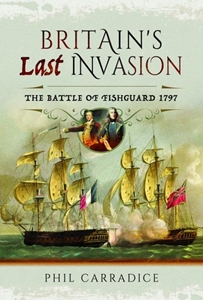Unusual tale from our maritime past
Britain's Last Invasion, by Phil Carradice
 In Britain's Last Invasion, historian Phil Carradice tells how the women of Fishguard came particularly to the fore that month when 1,400 drunken and out-of-control French soldiers from the Legion Noire landed for an attempted takeover. When the local men fled, the women stood fast, and one – armed only with a pitchfork – captured 12 enemy soldiers.
In Britain's Last Invasion, historian Phil Carradice tells how the women of Fishguard came particularly to the fore that month when 1,400 drunken and out-of-control French soldiers from the Legion Noire landed for an attempted takeover. When the local men fled, the women stood fast, and one – armed only with a pitchfork – captured 12 enemy soldiers.
The whole incident was hardly in the league of William the Conqueror, as Carradice readily acknowledges, but he makes a good case for this being a genuine invasion.
And although it was all over in a few days, he says it influenced the development of the British fleet – and even led to the introduction of paper money.
Britain's Last Invasion: The Battle of Fishguard 1797
By Phil Carradice
Pen & Sword
ISBN: 978 15267 43268
Buy this book in the Nautilus Bookshop
While you're there, why not browse the rest of the titles in our unique maritime bookshop, which sells all the books reviewed on these pages.
Buy nowMore Books
How to 'make it' in the superyacht industry
Superyacht Success, by Brendan O'ShannassyBack in 2022, we reviewed Brendan O'Shannassy's memoir Superyacht Captain. Now Capt O'Shannassy has returned with a new book that focuses on how crew can navigate their careers.
Love for seafaring conquers all
No Quitting, by Andrea BarkerAndrea Barker's memoir of her 1990s Merchant Navy cadetship tells of her eagerness and determination to follow the career pursued by generations of her family. Unfortunately, there were choppy waters ahead...
Radio revelry
Barques, Sparks and Sharks, by Len WilsonSeafarers are known for their story-telling abilities, and Orkney-born Len Wilson does not disappoint in this memoir of his years as a radio officer
Mastering our harbours
Harbours and Their Masters, by Mark Ashley-MillerNovice skipper Mark Ashley-Miller recently spent five years circumnavigating the UK and Ireland as a charity challenge – interviewing and photographing the harbour masters he met along the way.
